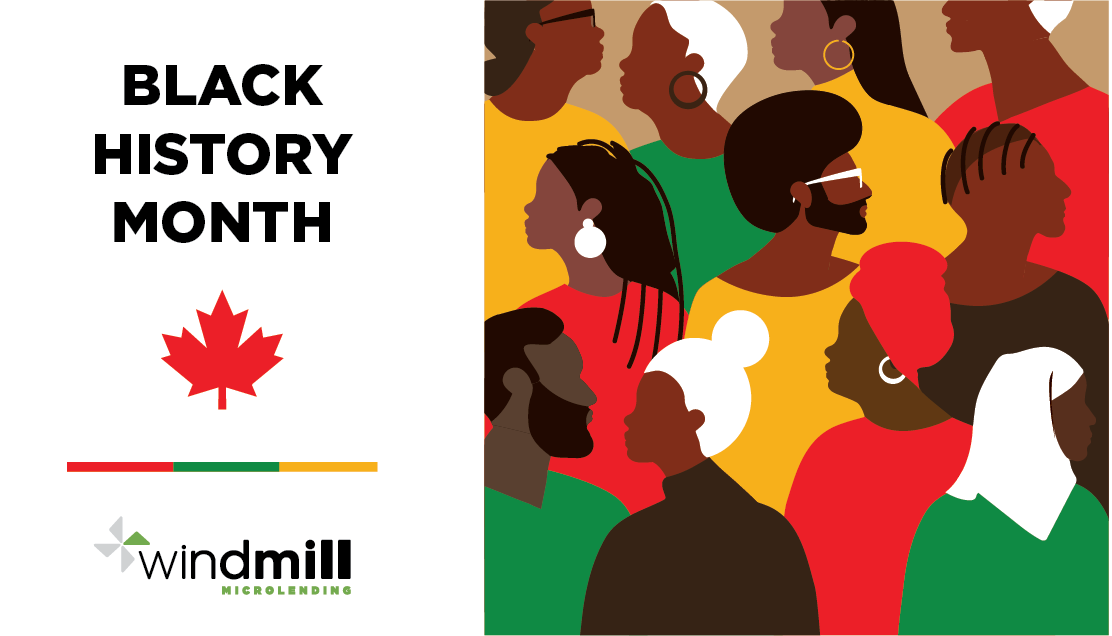Why immigrants and refugees should recognize Black History Month in Canada
Why immigrants and refugees should recognize Black History Month in Canada
February 23, 2023

Why immigrants and refugees should recognize Black History Month in Canada
February 23, 2023

A guest blog post by Windmill Microlending board member and former client,
Dapo Bankole
Estimated reading time: 4 minutes
In summary:
When I was growing up in Nigeria, I loved visiting our village at every opportunity. It was a family tradition. Even though we lived in various big cities across the southwestern part of the country, as children, my siblings and I knew our way to our village despite how remote it was.
I must confess, it didn’t seem to make sense to regularly leave the comfort of the city life, at first – give up electricity, tap water, air conditioning, etc. and visit a remote village? No way. However, with time, my feelings changed, and we eventually looked forward to discovering more about village-life and learning about our culture and heritage.
My parents had a very big orchard and farmland in our village home, and we could pick fruits directly from the trees. What a blessed life! And beyond the orchards and farmland, we made friends and built excellent relationships with other kids who either lived in the village or visited like us.

Dapo Bankole (pictured) is the founder of Mopheth Systems, a Windmill Microlending board director, a former Windmill client and a Canadian immigrant originally from Nigeria. He resides in Calgary with his wife and children.
More recently, my family returned to Nigeria for the first time since we immigrated to Canada in 2012, and we continued the family tradition, once again, visiting our village. It remains an important part of who we are – our history and identity.
My wife and I insisted we take our kids to our village. We did this because we cannot afford to forget our roots, our culture and how we got to where we are today. Even though our lives are now firmly planted in Calgary, learning from history allows us to understand the causes and consequences of past events and make informed decisions in the present and for the future. By studying history, we gain a deeper understanding of the context and motivations behind different actions and decisions, and how they have shaped the world in which we live.
Looking to achieve your career goals in Canada? Download Windmill Microlending’s Skilled Immigrant Career Success Guide for interview and networking tips as well as mentoring and financial planning advice.
A role for immigrants and refugees
This is why I believe immigrants and refugees, like me, have an important role in recognizing and celebrating Black History Month, which takes place every February. By educating ourselves about the contributions and experiences of Black Canadians, we can better understand the systemic challenges and barriers they face, find new ways to support and advocate for them, and, perhaps, better understand this country we call home. Doing so also allows us to reflect on our shared history and identity, and shared work in creating a more inclusive and equitable society for all.
Black Canadians have played a significant role in the development of Canada, from the Underground Railroad and their contributions in various wars in which Canada has fought, to the tragedy of Africville, and the incredible achievements of individuals like Viola Desmond, Lincoln Alexander, Jean Augustine, Oscar Peterson, Willie O’Ree or Angela James. Yet, often, their contributions may be overlooked or underrepresented in mainstream narratives or, for a number of different reasons, missed entirely by immigrants and refugees to Canada. Recognizing and celebrating the contributions of Black Canadians helps to create a more inclusive and accurate understanding of Canadian history but also the country as it exists in the present.
When newcomers celebrate Black History Month, we can better learn from and embrace one another. We can improve our understanding of another community’s heritage. In some ways, this is part of what it means to be Canadian. Maybe, even the best part.
{% video_player "embed_player" overrideable=False, type='hsvideo2', hide_playlist=True, viral_sharing=False, embed_button=False, autoplay=False, hidden_controls=False, loop=False, muted=False, full_width=False, width='1666', height='874', player_id='102355718272', style='' %}
LISTEN: Windmill Microlending Board Director Dapo Bankole discusses the importance of recognizing and celebrating Black Canadian history.
Regardless of your racial or ethnic background, to educate yourself on the history and contributions of Black Canadians, can be eye-opening. However, for Black-identifying newcomers, understanding these aspects of Canadian history and the current landscape can be particularly significant. It can serve as a source of pride and connection to your new home and the people in it who are most like you. Especially, because so many inspiring Black Canadians are also immigrants or refugees. It can also help to counteract feelings of isolation and marginalization you may be experiencing as a result of racism or discrimination.
So, what can you do as an immigrant or refugee to recognize Black History Month?
Here are five actions you can consider taking:
Action No. 1: Read about Black Canadian history and the experiences of Black Canadians today. Some recommended books include: The History of Black Canadians by James W. St. G. Walker; Black on Bay Street: The Toronto Experience by George Elliott Clarke; Black Like Who? by Rinaldo Walcott; They Call Me George: The Untold Story of Black Train Porters and the Birth of Modern Canada by Cecil Foster and The Skin We're In: A Year of Black Resistance and Power by Desmond Cole.
Action No. 2: Attend events and workshops that celebrate Black Canadian history and culture. Here are some options to explore.
Action No. 3: Connect with Black Canadian organizations and community groups. Joining these groups can provide an opportunity to learn more about the experiences of Black Canadians and to get involved in efforts to support communities across the country. This may be a good starting point: https://www.forblackcommunities.org
Action No. 4: If mutually agreeable, engage in conversations and discussions about Black Canadian history and experiences with Black Canadians. Ask them about their personal experiences and listen actively and respectfully. This can help to build understanding, empathy and encourage allyship.
Action No. 5: Seek out diverse media sources, including those produced by Black Canadians, and other marginalized communities. This can help to gain a more accurate and nuanced understanding of the history and contributions of Black Canadians, as well as the current challenges they face. Here are some media outlets to explore: https://www.cabj.news/blackowned-media
Could an affordable loan help you pay for the costs of accreditation, training, certification or career development in Canada? Find out if you are eligible for a Windmill microloan of up to $15,000 by completing our two-minute loan eligibility quiz. No Canadian credit history required.